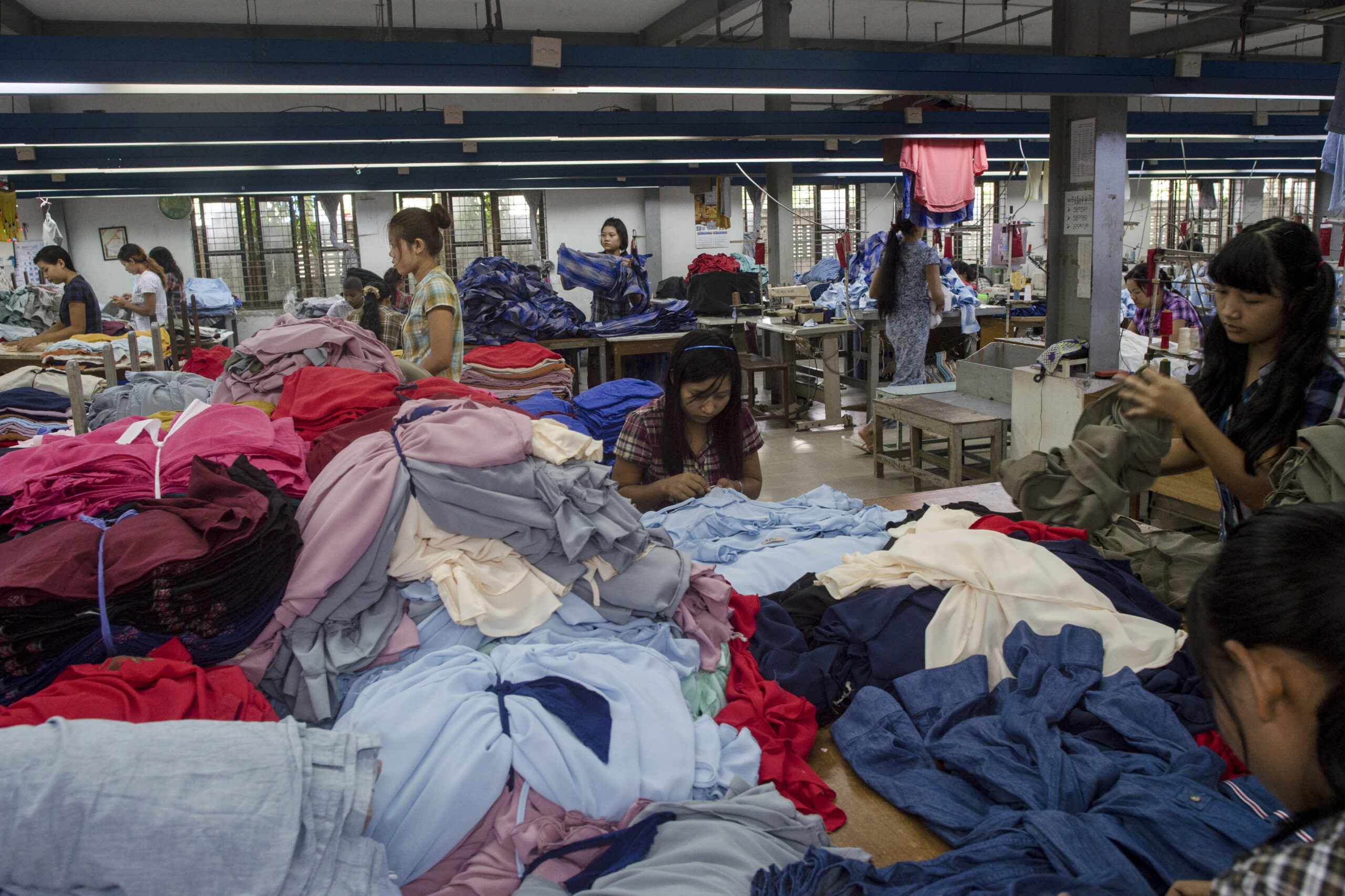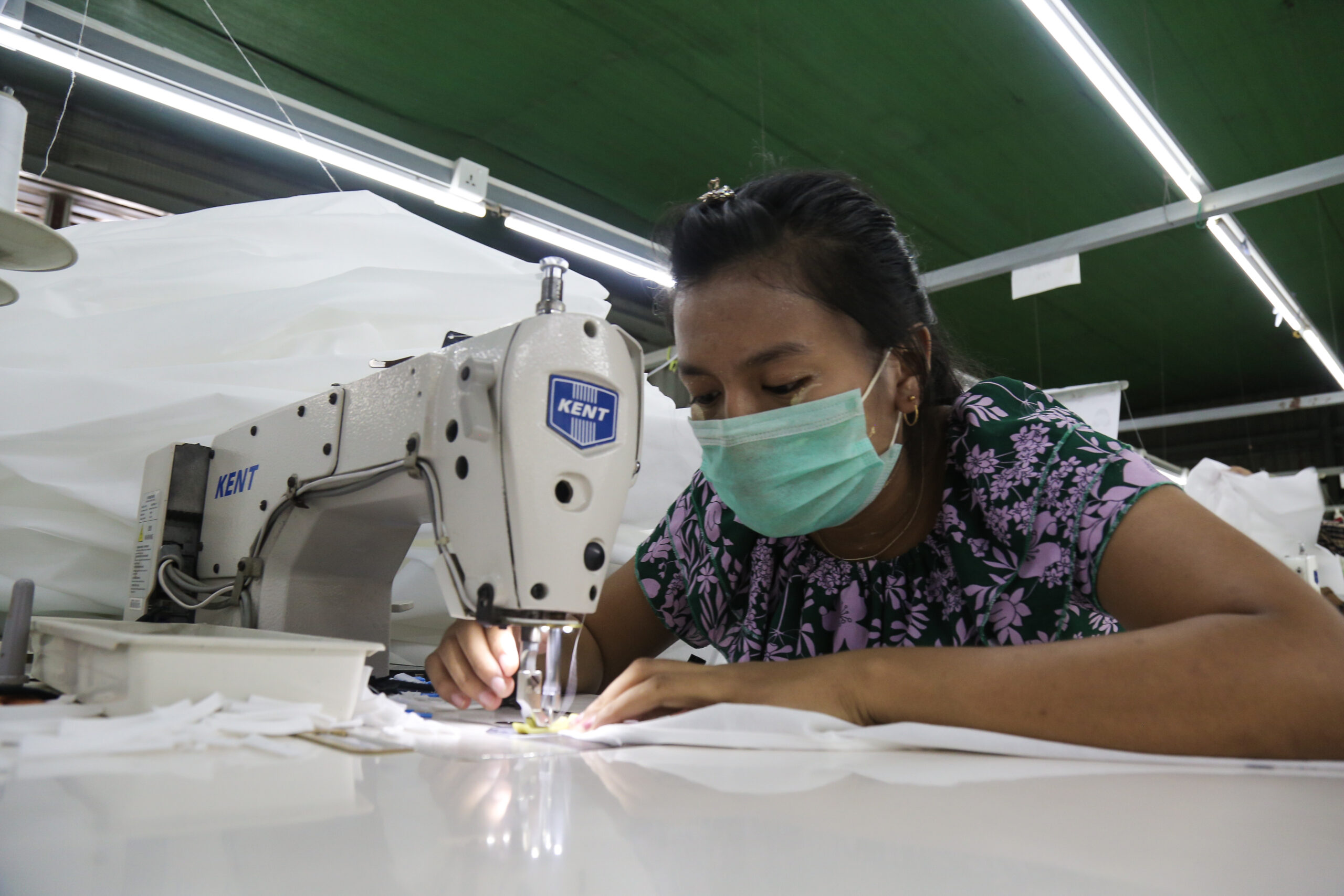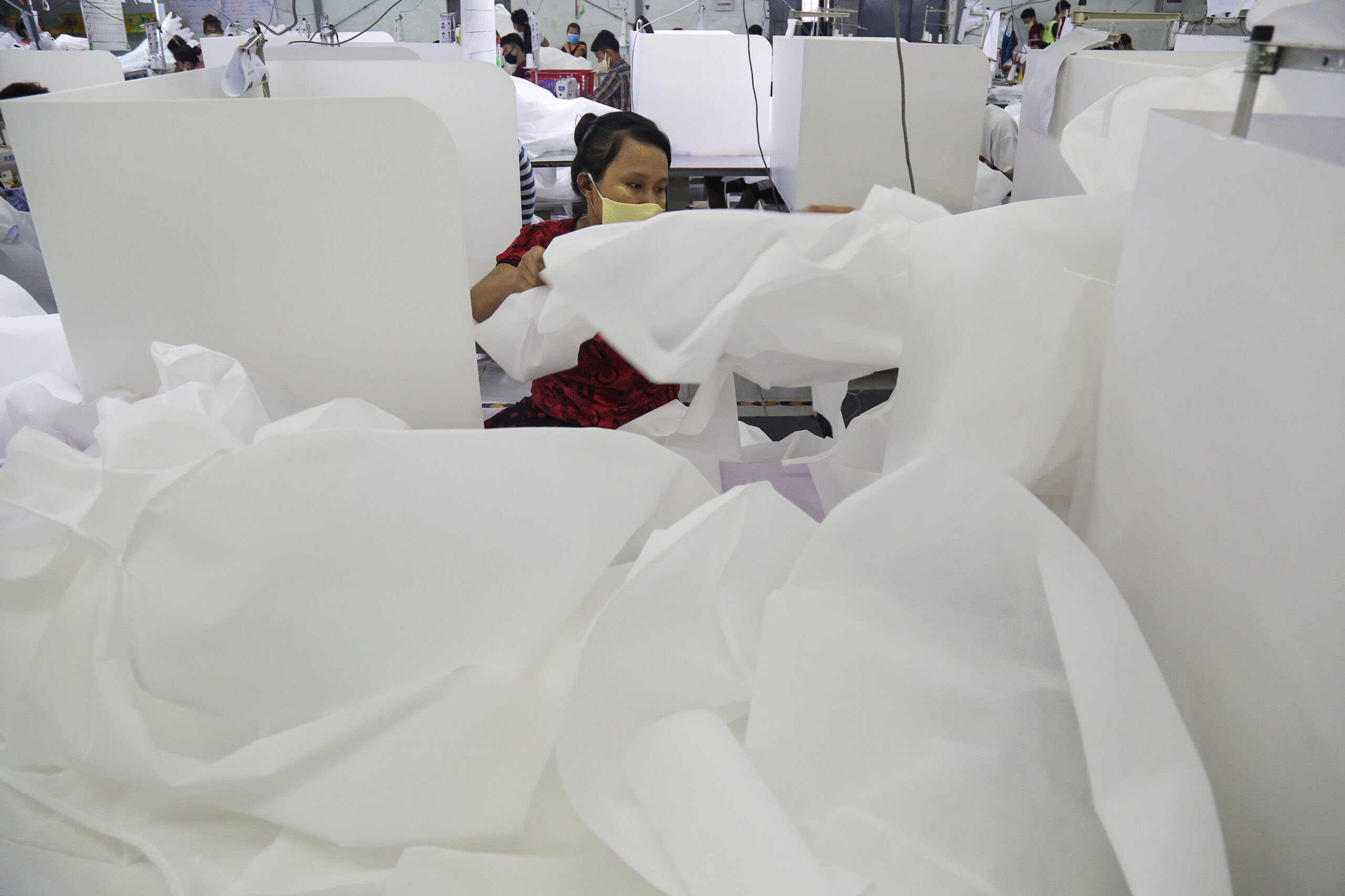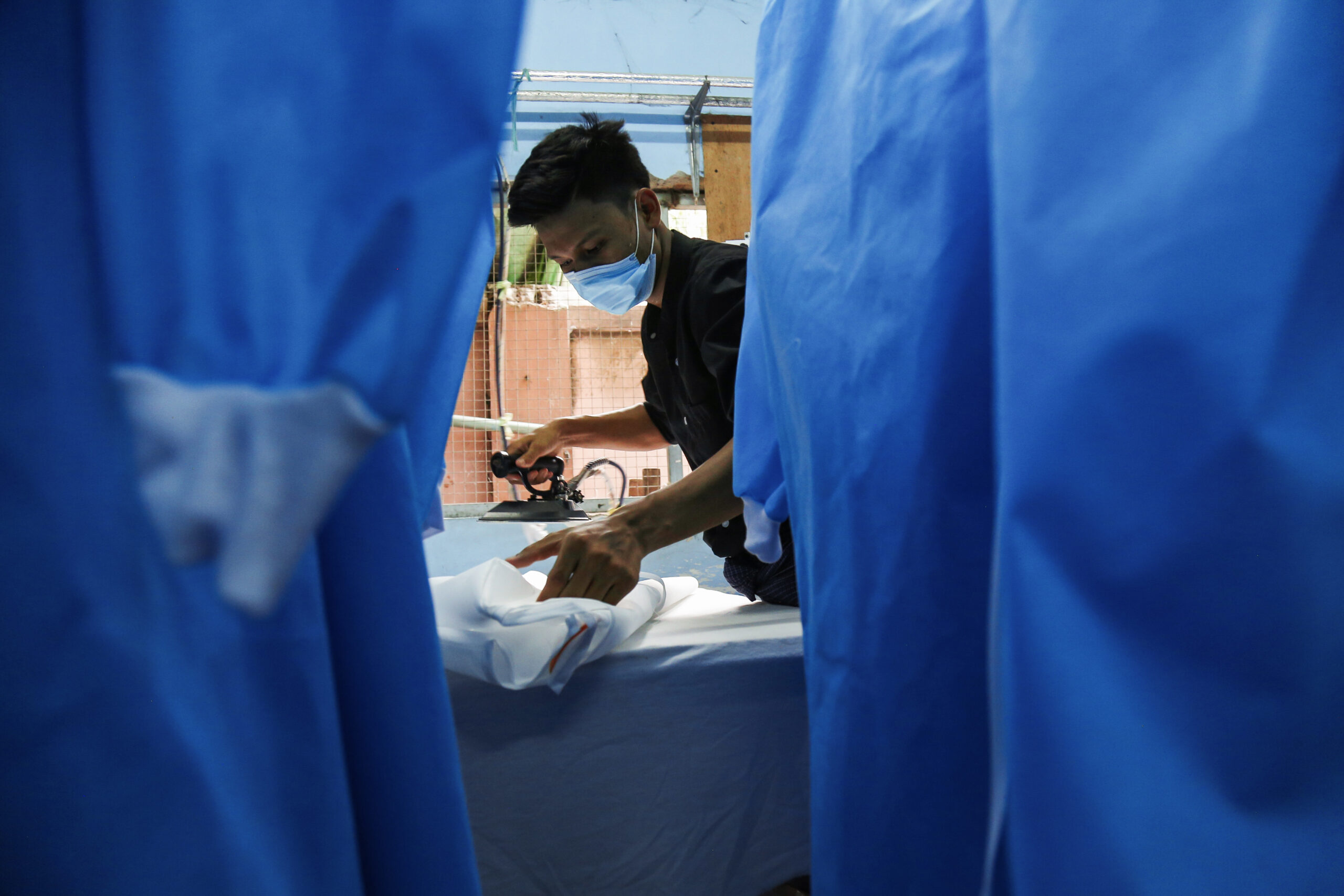Millions of people across the world wear ZARA shirts, H&M trousers, or Moschino shoes. But the production of these popular fashion brands still remains a mystery for most.
Brands would normally outsource their production to local factories in low-income countries to reduce their manufacturing and employment costs. This practice, however, carries high risk, with little to no direct control over the daily activities in the factories. Violations of workers’ rights, physical and mental abuse, unfair layoffs, and limited association freedom are just some of the threats facing against garment workers.
“The HR manager reported me to the military for participating in peaceful demonstrations for labour rights,” Aung* wrote in a report to the Industrial Workers’ Federation of Myanmar. “They then kidnapped me, torched my house, tortured me and slit my brother’s head wide open.”
Aung is a former garment worker in a factory producing textiles for multinational retail conglomerates H&M and Marks & Spencer in northwest Yangon, Myanmar, who faced harassment, torture, and forced labour before the factory manager laid her off.
Two years after the military coup, these kinds of events are becoming increasingly frequent, as the military is striving to maintain power amidst inflation and harsh international sanctions, and garment workers in Myanmar have had enough of the continuous abuse and labour rights violations. But a balance between the workers’ needs, international economic interests, and human rights is yet to be found.


While international organisations, states, and labour NGOs are encouraging brands to continue outsourcing their work to Myanmar, workers are calling for the immediate withdrawal of all international fashion brands from the country to reduce the income of foreign currency in the military’s pockets.
At the start of the year, the Business & Human Resource Centre tracked 198 cases of alleged labour and human rights abuses perpetrated against at least 104,000 garment workers since the military takeover.
The longer brands stay, the longer the military will survive, according to Khaing Zar Aung, treasurer of the Confederation of Trade Unions Myanmar and president of the Industrial Workers’ Federation of Myanmar.
“The brands are bringing in what the military needs,” she said. “They are equally responsible for all the killings in Myanmar.”
Although before the 2021 coup garment workers were already mobilising for freedom of association and labour rights, growing reports of harassment and abuse from employees confirmed that in the past two years, their working conditions have alarmingly worsened.
“We could restore democracy in a short time if only international bodies stop giving legitimacy to the military by bringing foreign currency in,” Khaing Zar Aung said.


More violations after the coup
Before the coup, trade unions signed official agreements with the factories enshrining the workers’ rights to association, medical leave, fair wages and social security. But things have changed since then. None of the previous guarantees are now in place in garment factories.
Labour conditions have been worsening for the past two years since the coup, when employers began cooperating with the military authorities, hoping to gain financial benefits and ensure their own safety. Managers now act as watchdogs for the military in their garment factories.
The Myanmar Garment Manufacturers Association reported that the exports of garments made under the Cutting, Making, Processing (CMP) system in Myanmar made $4,7 billion dollars of income in 2022, but data provided by the Industrial Workers’ Federation show that the workers’ salaries amount to a total of just 5.30% of the 2022 export income.
The current minimum wage in garment factories in Myanmar is $1.68 a day, approximately half the minimum wage before the coup and the high rates of inflation that followed it. But besides it not being enough to even feed one person, workers can’t earn it unless they complete the amount of work assigned, which would normally require them to work between 10 and 14 hours a day and skip their weekly day off, Khaing Zar Aung told the Globe.
“Workers are slaves now,” she said. “If they report the abuse, the military would torture, arrest, or kill them.”
But because of the reduced power of trade unions, there is no more effective social dialogue and the workers’ rights continue to be violated, according to Khaing Zar Aung’s experience.


During the pandemic, the military also took advantage of the situation and proceeded to dismantle more labour unions and persecute union members, explained Mayisha Begum Labour Programme Assistant at Business & Human Rights Resource Centre.
“Workers and unionists have been increasingly targeted,” she said. “The military often works in coalition with employers and burns down the villages of those who advocate for their labour rights.”
While some workers and unionists had no choice but to stay, others fled or hid either abroad or in remote villages amidst ongoing intimidation. Khaing Zar Aung fled to Germany soon after the coup but she has never stopped working closely with her team in Myanmar, which is now scattered across the country and mostly working anonymously after the authorities raided their office, seized all the documents, and computers, arrested some of the staff and revoked the validity of their passports.
The organisation remains operative but often can’t prove the alleged violations against workers to the brands’ headquarters, as it prioritises the workers’ anonymity and safety. Once received the complaints, the brands would start a dialogue with the accused factory leaders to investigate the violations. But once the factory denies the allegations, brands have little to no power to address the violations on the ground.
“Brands don’t have any leverage,” Khaing Zar Aung said. “They just have to leave.”


Responsible exit
But the international business community, including several major fashion brands, has different plans.
The majority of international brands included in the Business & Human Rights Resource Centre (BHRRC) violation tracker claim that their relations with the supply chain align with the international code of conduct and the human rights principles, such as due diligence and adequate remedies to violations, according to Natalie Swan, labour rights programme manager at the BHRRC.
“They are not taking actual responsibility for the violations on the ground,” she said. “Brands should consider a responsible exit from the country.”
As brands don’t have any legal obligation to eliminate human rights abuse from the supply change, the burden to perform due diligence is barely felt in countries with weak labour rights and limited civil rights liberties such as Myanmar, Swan explained.
Responsible exits and due diligence in this field are still emerging concepts. Because of a lack of clear regulations, Myanmar has recently seen an increase in brands adopting a “cut and run” approach, which would leave the workers without a job within a day. To prevent further expansion of this trend, Clean Clothes Campaign, the world-leading alliance of labour unions and non-governmental organisations in the garment industry, released a list of unofficial guidelines on what due diligence should look like in the garment sector in Myanmar at the start of the year and called for brands to be more transparent with stakeholders, workers, civil society, and consumers.
“A good exit will be done in partnership with rights holders, not at their expense,” Swan said. “What matters are the workers’ needs, ultimately.”
She argued that best practices would include in-person dialogues between chief representatives of the brands and the workers.
The reality on the ground, however, looks different. Reports of abuse and violations continue to flood the desks of human rights organisations and labour unions and the popular European fashion brand H&M is often in the eye of the storm for allegedly failing to ensure a fair wage to the workers and neglecting their labour rights.
In a comment to the Globe, the brand’s media relation team said that H&M will “continue to monitor closely the developments in Myanmar. In the current situation, we are very mindful of the fact that many people in the country rely on international companies for their livelihood. As things stand, we are refraining from taking any immediate decision on future order placement and will continue to work with all stakeholders.”
While H&M seems to have no plans to leave Myanmar anytime soon, some other Western retailers such as Primark, Aldi South Group, and C&A announced their exit from the Myanmar garment market in late 2022. But according to Swan, it is yet to see how they are practically proceeding with the withdrawal. This would likely have different outcomes as the length of the business partnership contract between brands and factories differs, as well as the relationship between the two entities.
Especially because each garment factory in Myanmar normally has contracts with 6 or 7 different brands, the exit of one brand would not necessarily affect the survival of its partner factory.
“Now it’s a wait-and-see moment to see how brands who announced the exit can extricate from that market sustainably and responsibly,” said Swan.
Responsible sourcing
But Karina Ufert, CEO of EuroCham Myanmar, and Vicky Bowman, director of the Myanmar Centre for Responsible Business, are not entirely convinced a responsible exit exists. They believe that companies should continue sourcing in Myanmar by undertaking heightened due diligence and gaining more leverage by consolidating their relationships with factories.
“While staying engaged in the country, brands can exercise their leverage to improve working conditions for hundreds of thousands of workers,” Ufert said. “Disengagement of the responsible brands will only lead to a further deterioration in the situation for the workers’ rights and contribute to greater unemployment.”
The Myanmar Centre for Responsible Business has been partnering with the European Chamber of Commerce to implement the SMART TaG programme over the past decade, and its successor 2022-2026 Multi-Stakeholder Alliance for Decent Employment (MADE) programme, to support responsible business practices, improve working conditions and reduce labour rights abuse in Myanmar’s garment industry.
Brands have to leave now!
But the projects saw a strong backlash from labour unionists and workers for promoting a series of training for management and workers – chosen and sent by employers – to develop operational grievance mechanisms, formal procedures for workers and stakeholders to submit complaints to the company, and for guiding employers to form workplace coordination committees composed of a team of employer and worker representatives.
“These are impossible procedures in a country where rights to freedom of association and collective bargaining agreements are banned,” Khaing Zar Aung said. “Workers are tortured or arrested if they get involved in such mechanisms.”
Labour union representatives strongly believe that the quickest and most efficient way to restore democracy and labour rights in Myanmar is for the EU to withdraw any business and financial involvement from the country. Khaing Zar Aung also urged the EU to comply with its own values and principles, and effectively implement the sanctions against Myanmar.
“We prefer to lose our jobs and have short-term suffering rather than continuing being treated like slaves,” Khaing Zar Aung said. “Brands have to leave now!”


